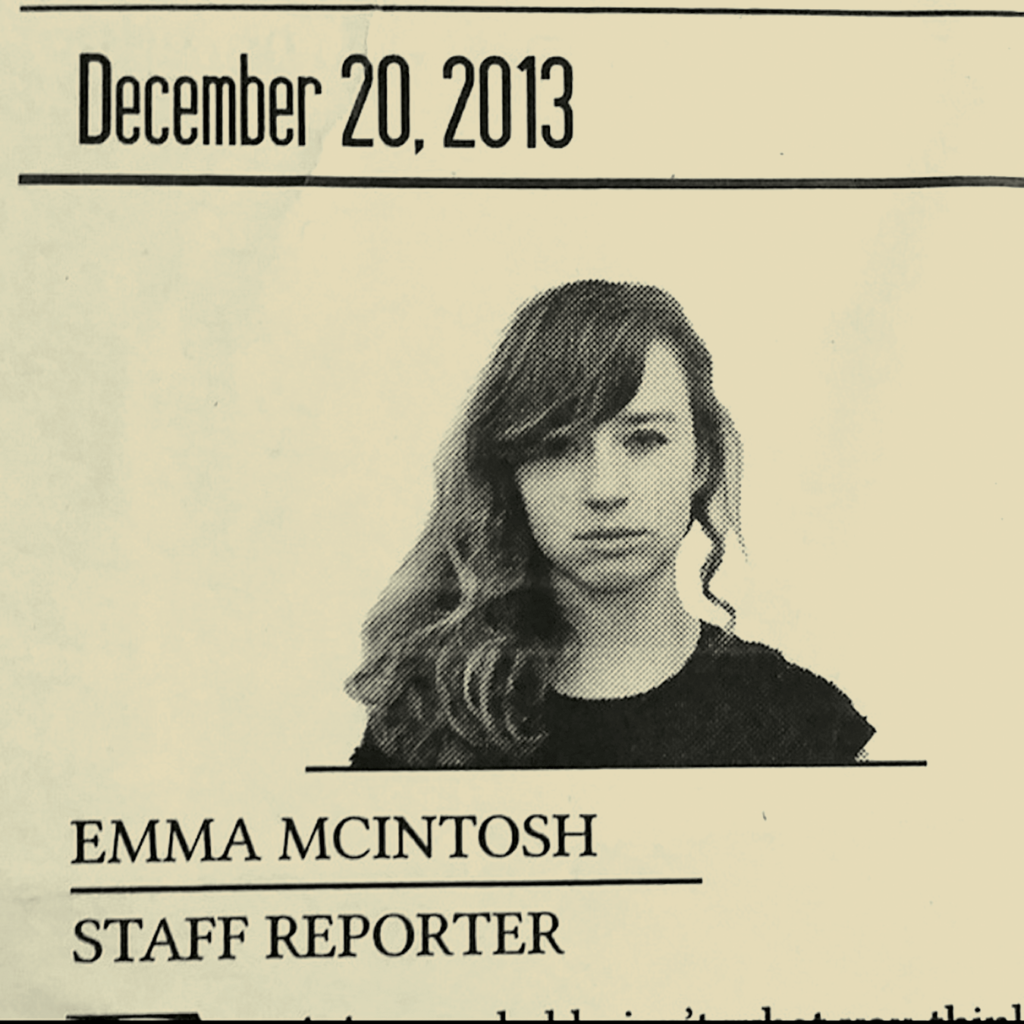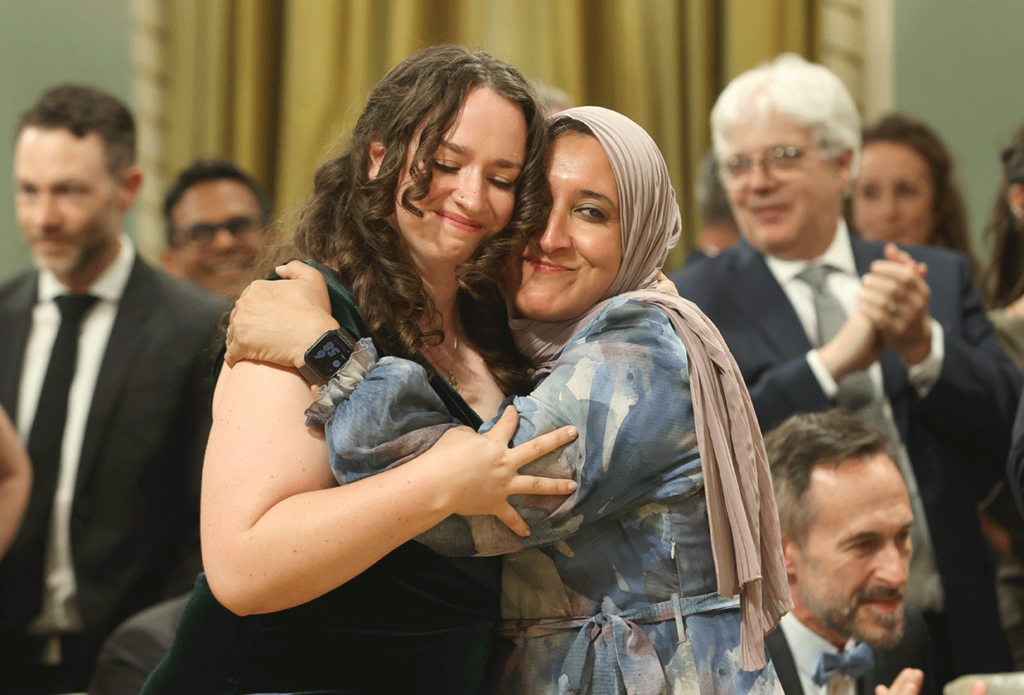How Emma McIntosh cooks up groundbreaking investigations

Photo: courtesy Emma McIntosh
“Looking back, where did I get the audacity to do that?” asks Emma McIntosh, reflecting on her early days as a journalist in high school. “There was this quote that went along the lines of ‘Mr. V. declined to comment, stating a desire to keep his professional life and community work separate.’ I was crazy.”
McIntosh had gotten hold of a leaked document revealing that a certain student group, claiming to be inclusive of all genders and sexual orientations, was discriminating against queer people when considering applications to fill its leadership positions. The “Mr. V.” in question was McIntosh’s teacher, whom she interviewed for the story. “My own calculus teacher,” says McIntosh, “as if he wasn’t going to be marking my test later that day.”
For her investigation, McIntosh interviewed several community and school members, providing them with the opportunity to share their perspectives. At one point, she interviewed a track-and-field teammate’s dad, whose son one of her friends had a crush on. She thought no one was off limits in terms of accountability. Sitting on the couch in her parents’ basement, as she prepared to interview him, she was nervous. She was something else, too, something that stayed with her while preparing the final details: “There was this shaky anxiety in my chest.”
Forging Her Own Path
An experienced investigative reporter, McIntosh currently works at Toronto Star‘s investigative team. She, along with the Star and The Narwhal, won the 2023 Michener Award for their joint reporting on Ontario’s Greenbelt, exposing how Premier Doug Ford’s backdoor deals with land developers put the protected area at risk. It sparked a series of events that led to saving environmentally sensitive areas, preserving farmlands, businesses, and many endangered animal species. The Auditor General of Ontario, Bonnie Lysyk, praised the coverage, stating it “greatly contributed to public awareness and ultimately to the provincial government reversing its unsupportable decision to remove specific lands from the Greenbelt.”
“The Greenbelt has been an obsession for me,” McIntosh said on Paydirt, a collaborative miniseries with The Big Story podcast. In the first episode, “It’s Not Easy Being Green,” McIntosh says the Greenbelt reporting had been years in the making.
Before joining The Narwhal in 2021, McIntosh gained experience in newsrooms across the country, including the Toronto Star, Canada’s National Observer, and the Calgary Herald. She says mentors were crucial to her career and development as a journalist, naming several successful reporters. And yet, those journalists say they had nothing to do with her success. They say McIntosh always forged her own path—something evident since her high school days, carrying a pad of paper and a determination to find the truth. Mike De Souza, director of enterprise and investigations at The Narwhal, has known McIntosh since 2015. While he is honoured to be considered a mentor, he emphasizes McIntosh’s own journalistic prowess. “I wouldn’t want to be portrayed as instrumental in Emma’s career,” he says. “I don’t want to take credit for all the fantastic accomplishments she has achieved.”
If her mentors are reluctant to take credit for McIntosh’s drive and curiosity, maybe it comes down to a humbling revelation she had, fresh out of university, while working at the StarMetro in Calgary: “I realized just how much I didn’t know.”
Humble High School Beginnings
McIntosh filed her first Freedom of Information request while in high school. That changed her experience with her high school newspaper and led her toward investigative journalism. She had been considering post-secondary science programs and thought about applying to an astrophysics program. “I was slowly realizing that was a bad idea,” she says, “because I was not actually that good at math.”
Born in Montreal, McIntosh is a dual Canada-U.S. citizen. She lived in Ottawa until Grade 3, California until Grade 6, and then Seattle, where she attended high school. In the suburbs of Seattle, McIntosh found her passion for journalism. To ease her science class load, a school counsellor suggested she take a newspaper or geology course. It was an easy decision. “The whole point was, you just plan a camping trip and go look at rocks,” she says about the geography option. “I don’t have time to go camping.”
Into the newspaper course she went. With friends, McIntosh quickly agreed to avoid the typical high school coverage of drug use, eating disorders, and school shootings. She wanted something better—journalism that mattered to the people reading the paper. Within two months, after appointing herself team investigative reporter, she interviewed her first confidential source, who gave her inside information about how students were sneaking alcohol into the school’s football games.
McIntosh’s quest to uncover the truth, something she later discovered could be more sinister than concealed booze on campus, has proved to be an asset in the many newsrooms to which she has contributed. It’s this tenacity that inspires Elaine Anselmi, Ontario bureau chief of The Narwhal. Anselmi says McIntosh has a “doggedness,” an unwillingness to give up. She is passionate and enthusiastic, yes, but the work is highly organized into databases of sources and information.
McIntosh’s decision to hone a beat at The Narwhal was intentional. “I wanted to do for environment what Ben Spurr at the Toronto Star did for the transportation beat,” but with her own spin on it, she says. She wanted to focus her beat reporting on issues that had room for investigative scrutiny—like the Greenbelt.
McIntosh likens her career progression to bases around a baseball diamond. First base meant making a name for herself. “I wanted to remind people I was there,” she says, recalling the challenges of her career amid the COVID-19 pandemic. “So, first base was stories I did to cover my beat. People would expect punchy stories from me, like the bread and butter of daily news.”
Second base—being the first to the punch—was more challenging. “Can I write a feature that’s cool and that no one else is writing about this week? Can I be the first one to notice something?”
Third base was about the larger picture, zooming out and searching for an investigation to pursue—something with the potential to be expanded further down the road. “Can I get a document? Can I get someone to give me an exclusive? Can I get something that’s maybe more of an investigative issue in nature, but not a full investigation yet?” asks McIntosh. “If the opportunity for a bigger story landed on my lap, I would be ready.”
“Just to push the baseball metaphor to the absolute limit,” McIntosh continues, “I don’t even play baseball, but we all know that a home run doesn’t just happen. You have to get something good to work with, and be able to step up to the plate and hit it. I want to be ready so that if the right moment comes, I can step to it. And, hopefully, if I do enough of those third-base stories, I will find myself on home base eventually.” McIntosh hit it out of the park with her award-winning Greenbelt series. But, in the beginning, it wasn’t immediately clear that she had scored a home run.
Down but Not Out

Photo: Patrick Doyle / The Canadian Press
After an extended period of time accumulating data and interviews on the Greenbelt issue, the joint investigation was published in November 2022. Initially, it seemed to have little impact. “I remember we had worked so hard on this investigation, and I was burnt out,” says Noor Javed, McIntosh’s reporting partner from the Star.
Javed admitted to McIntosh that she was dejected by the lack of political reaction. McIntosh, in her youthful optimism, assured her their work hadn’t been in vain. “She said we put it on the public record, and no one can take that away from us. She was right—we just had to wait and the fallout came.”
McIntosh and Javed’s investigation set off a chain of events that led to an official audit from Ontario’s auditor general, who received countless requests from the public to look into the proposed bill to remove land from the Greenbelt. After the auditor general released her report, two Ontario ministers resigned from their positions, and the RCMP initiated an investigation.
Government officials pushed back at The Narwhal. McIntosh continued investigating. She uncovered documents revealing that Ontario Premier Doug Ford had discussed plans for the Greenbelt long before it was introduced to the public. Ford’s team released a false statement denying this angle. The government referred to these documents internally as the “Greenbelt Files.” In response to McIntosh’s exposure of the Greenbelt Files, several of Ford’s chief deputies of staff, including Ivana Yelich and Cody Welton, took to X to challenge McIntosh’s reporting. “The story is not true,” Welton posted.
“That was stressful,” says McIntosh. “Obviously, reporting from a smaller outlet, I’m not expecting anyone to be cozy with me. That’s never been my reality.”
McIntosh had already experienced pushback from government officials. Denise Balkissoon, executive editor at The Narwhal’s Ontario bureau, has seen McIntosh handle these kinds of challenges. Working for a relatively new publication, while entering a legacy outlet–focused and male-dominated journalistic space like Queen’s Park, is difficult. “The Ontario government rarely responds to any of our media requests, and tried to dismiss The Narwhal and be condescending,” says Balkissoon, adding that McIntosh is “overcoming a lot of traditional systemic barriers and not letting it stop her from doing the work she knows is important.”
Chasing Wonder
Karan Saxena, audience engagement editor at The Narwhal, has a novel friendship with McIntosh. “I get to bully her a lot,” they say, “especially about her birdwatching.” In the summer of 2022, McIntosh reached as high as thirteenth place among all the birders on Manitoulin Island. Birders are ranked based on how many times they submit a list of birds and the species they spotted on the app eBird. At the end of 2022, McIntosh had finished in sixteenth place among all Manitoulin birders for that year. As a “vehicle for wonder,” says McIntosh, birdwatching requires stillness and mindfulness. It’s a chance to get away from the desk, but it also ties back to McIntosh’s work.
Birdwatching first sparked McIntosh’s attention when she was walking along Toronto’s waterfront during the pandemic. She noticed some of the ducks on the water were not mallards, but another species she was unaware of, which tickled her curiosity and, eventually, led to a hobby. “Birds are an indicator of their environment,” she says. What’s going on with them is an indicator of what’s going on with everything else in the ecosystem.
While birdwatching helps McIntosh stay in tune with the environment, it also serves as a motivator, proving the importance of her work. “It’s a good exercise learning the language of nature,” she says. “It’s hard to do that and not feel motivated.”
All in Due Time
To some, it may seem that McIntosh burst onto the investigative journalism scene out of nowhere. Others say it was just a matter of time. Robyn Doolittle, a business reporter and former member of the investigative team at The Globe and Mail, who has known McIntosh since her early years in the industry, is not surprised by her success. “She’s evolved into what it was clear she was going to be, an exceptional investigative journalist.”
Diana Zlomislic, a longtime reporter at the Toronto Star, who met McIntosh in her days as an intern, is unsure McIntosh’s innate talents can be taught. “Can you learn to have a sense of urgency to approach the world with? Can you learn to have a constant state of curiosity?”
McIntosh’s reporting, particularly on the intersection of environmental issues and politics, has had a ripple effect on the media landscape in Ontario and Canada. Her work played a key role in the reversal of the controversial bill that aimed to remove tracts of land from the Greenbelt. As a result, she now has the profile to sound the alarm on other important environmental issues. The Greenbelt investigation helped set the stage for her reporting on the proposed Highway 413, a project that has been criticized for its potential disruption to wetlands, waterways, and at-risk species. McIntosh continued to cover the story from The Narwhal newsroom, until she announced in mid-April she was starting a new job at the Toronto Star.
McIntosh’s recipe for reporting is comparable to her mother’s chocolate zucchini cake. The concept is that the scientific and policy parts of a story (the zucchini) are made more compelling by the chocolate parts, which are the juicy narrative, the digital design, and the beautiful photos. “A lot of pollution stories are inherently stories about public trust, government responsibility, and accountability,” she says. “I can frame an environmental story in a way that brings in those other themes and gives people something else to be interested in—like my chocolate zucchini cake.”
About the author
Emily is in her final year of her Bachelor of Journalism at TMU, fulfilling a minor in Politics and Governance. She has written for the student magazine CanCulture and finds interest in stories about local and international politics, as well as social and environmental issues. Outside of her reporting, she spends most of her time playing soccer, reading just about anything she can find and spending time with her family.

